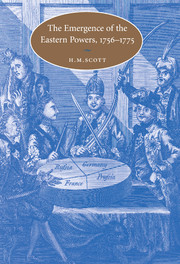Book contents
- Frontmatter
- Contents
- List of maps and genealogical table
- Acknowledgements
- A note on dates and place names
- List of abbreviations
- Introduction: the eighteenth-century European states system and its transformations
- 1 The rise of the eastern powers
- 2 The Seven Years War and the European states system
- 3 The domestic legacies of the Seven Years War
- 4 The stabilisation of Europe, 1763–1766
- 5 Diplomacy and the eastern powers
- 6 From peace to war, 1766–1768
- 7 The partition of Europe, 1768–1772
- 8 The advance of Russia, 1772–1775
- Conclusion: Russia and the emergence of the eastern powers
- Bibliography
- Index
- CAMBRIDGE STUDIES IN EARLY MODERN HISTORY
4 - The stabilisation of Europe, 1763–1766
Published online by Cambridge University Press: 16 July 2009
- Frontmatter
- Contents
- List of maps and genealogical table
- Acknowledgements
- A note on dates and place names
- List of abbreviations
- Introduction: the eighteenth-century European states system and its transformations
- 1 The rise of the eastern powers
- 2 The Seven Years War and the European states system
- 3 The domestic legacies of the Seven Years War
- 4 The stabilisation of Europe, 1763–1766
- 5 Diplomacy and the eastern powers
- 6 From peace to war, 1766–1768
- 7 The partition of Europe, 1768–1772
- 8 The advance of Russia, 1772–1775
- Conclusion: Russia and the emergence of the eastern powers
- Bibliography
- Index
- CAMBRIDGE STUDIES IN EARLY MODERN HISTORY
Summary
In January 1763, the final month of the Seven Years War, the Polish King Augustus III became seriously ill. Though he recovered, his health again worsened in the autumn and he died, on 5 October. His death, unexpected at least in its suddenness, confronted Europe's leading states with a difficult and perhaps dangerous problem little more than six months after peace had been restored. Poland's throne had been elective since the sixteenth century, and vacancies had usually provoked an international crisis and sometimes actual fighting. The last royal election, that of 1733, had been accompanied by a full-scale conflict, the War of the Polish Succession. By the mid-eighteenth century, the country's archaic constitution, weak monarchy and powerful magnate class had made it an arena for great power rivalry. Poland's powerful neighbours had come to support one or more of the noble factions which dominated political life and were anxious for the foreign backing which might enable their own ambitions to be realised.
In 1763, however, all the leading states were exhausted, preoccupied with domestic reconstruction, and therefore reluctant to confront the situation created by Augustus III's death. On hearing the news, Frederick the Great caustically observed that he could not stand the Poles; they were always doing things at the wrong moment. The King's real fear of a new war was widely shared. The early months of peace had been marked by considerable political uncertainty, mingled with caution.
- Type
- Chapter
- Information
- The Emergence of the Eastern Powers, 1756–1775 , pp. 103 - 139Publisher: Cambridge University PressPrint publication year: 2001

